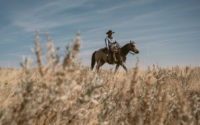At the World’s End with Hurray for the Riff Raff and Adrianne Lenker
I cannot shake this mounting sense of finality. Things are bleak on several fronts—geopolitically, environmentally, technologically—and alongside those tremors come study after study showing the long-term ramifications of covid: How it increases the risk of heart attack and stroke; how it acts as an oncogenic agent; how it ages the brain; how it dysregulates the immune system, leading to long covid; how, even if someone escapes long covid, their immune system may be so compromised that it gets harder to recover from other milder illnesses. (The anecdotes swirling nowadays as everyone fights off a bug they can’t shake.) It is not a virus you want to get again and again.
Those of us in the long covid community or still concerned about covid safety pay attention to these findings, making the monolithic decision from numerous health agencies around the world to discard covid protocols all the more concerning. Without any effort to minimize reinfection, how are we to assume there will be a healthy populace just a few years from now? The path these bureaucratic choices have put us on settles like an encompassing grief, a roiling, oppressive fog, and no amount of protests, letter writing, or science has thus far swayed the course.
At the local level, I once tried more persistently to share this knowledge, but people did not want to hear it, ignoring long-term possibilities for short-term pleasures, which to be fair isn’t anything new given how we’ve decided to “address” climate change. It’s human nature to kick the can down the road until there’s no road left. The silence I came to live in felt unbearable—and then I found two of the most unexpected release valves: Hurray for the Riff Raff‘s song “Ogallala,” off their new album The Past is Still Alive, and Adrianne Lenker‘s song “Donut Seam,” off her new solo album Bright Future. Both called out—so clear-eyed, so adamantly—the ticking clock. What a strange relief.
“Ogallala” details a memory from lead singer Alynda Segarra’s past when they traversed the titular Nebraska city with their companion, fighting the strain it put on their relationship. Segarra sounds especially hesitant to let it go: “Cause I don’t like change/ And I hate goodbyes.” Against pedal steel as hazy as a heat wave on the horizon, they sing resignedly, almost wistfully, about their corroding hope, “You know that scene/ At the end of Titanic?/ Well, I’m the one who’s/ Still playing on the deck.”
Segarra builds a metaphor between their fated romance and the future of the world, the song’s slow tread—a kind of surrendered shuffle—building to an apocalyptic pitch. “I used to think I was born/Into the wrong generation/But now I know/I made it right on time/To watch the world burn,” they sing as the music moves from the quiet stillness of that confession into a swirling chaos through which their voice holds steady like a flame. It’s pure catharsis.
Lenker’s song is sweeter, a front-porch folk tune framing her fated love for another against the looming sense of environmental disaster. Looking both behind and ahead, she considers the possibility of living more fully against the bookends of that decay. ‘This ol’ world is dying/ Don’t it seem like a good time for swimming/ Before all the water disappears?” she sings on the chorus, an acoustic guitar strumming in tandem. In the waterdrop of her voice, I hear exhilarating sinkholes and outsized splashes.
Lenker’s resolution to live more fully and presently seems like a true way forward. Even without these catastrophes near at hand, life has never been one to offer guarantees. The nature of existence—namely that it ends—casts a shadow on everyone’s time here. Best, then, to live each day as big as you can, grabbing tight to the love around you and offering yours in kind for whatever time is left. I adore that sentiment, but I haven’t forged my way through the bigger grief just yet—if such advancement is even possible. Maybe it’s about living despite, living alongside, living within, so the remaining moments are yours to claim, outpacing the shadows by one step, maybe two, and then no more.



